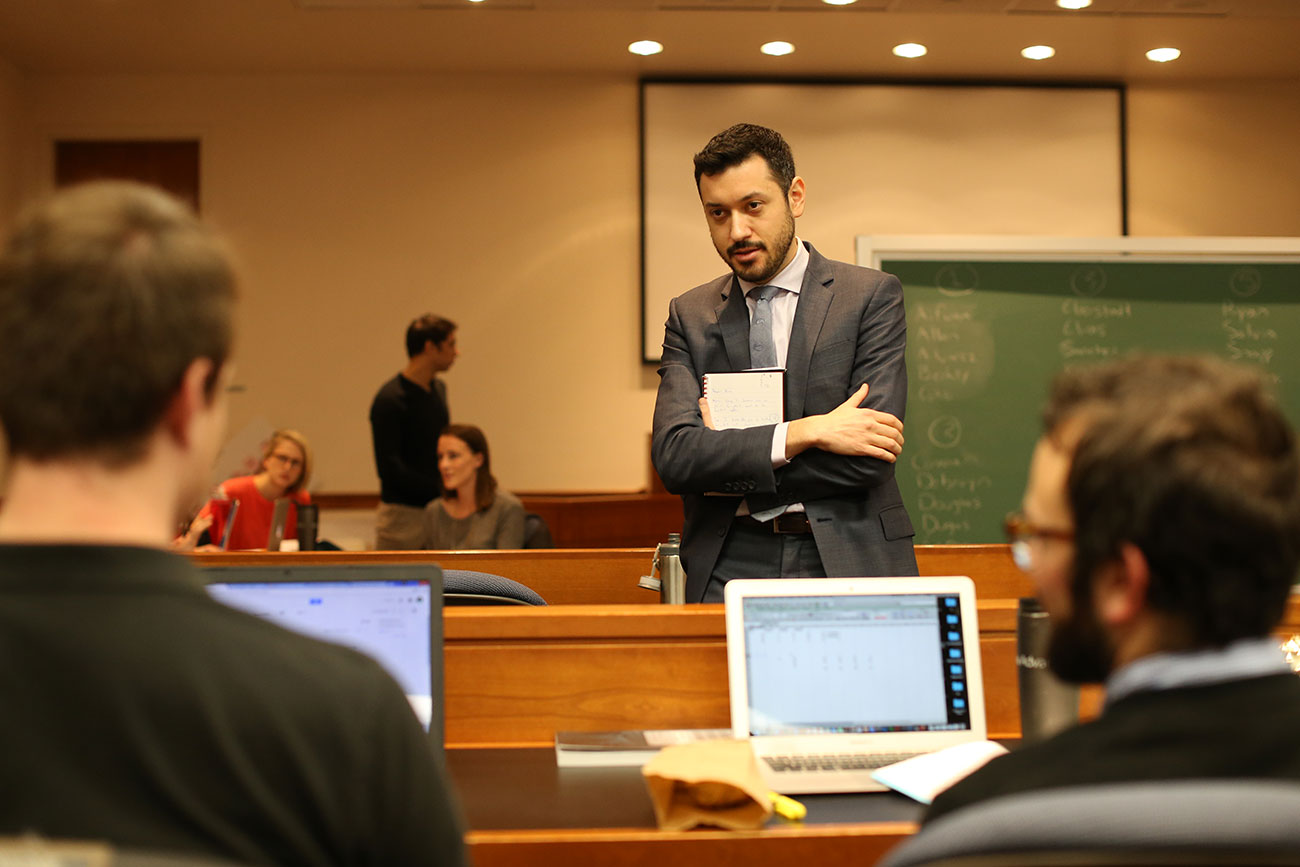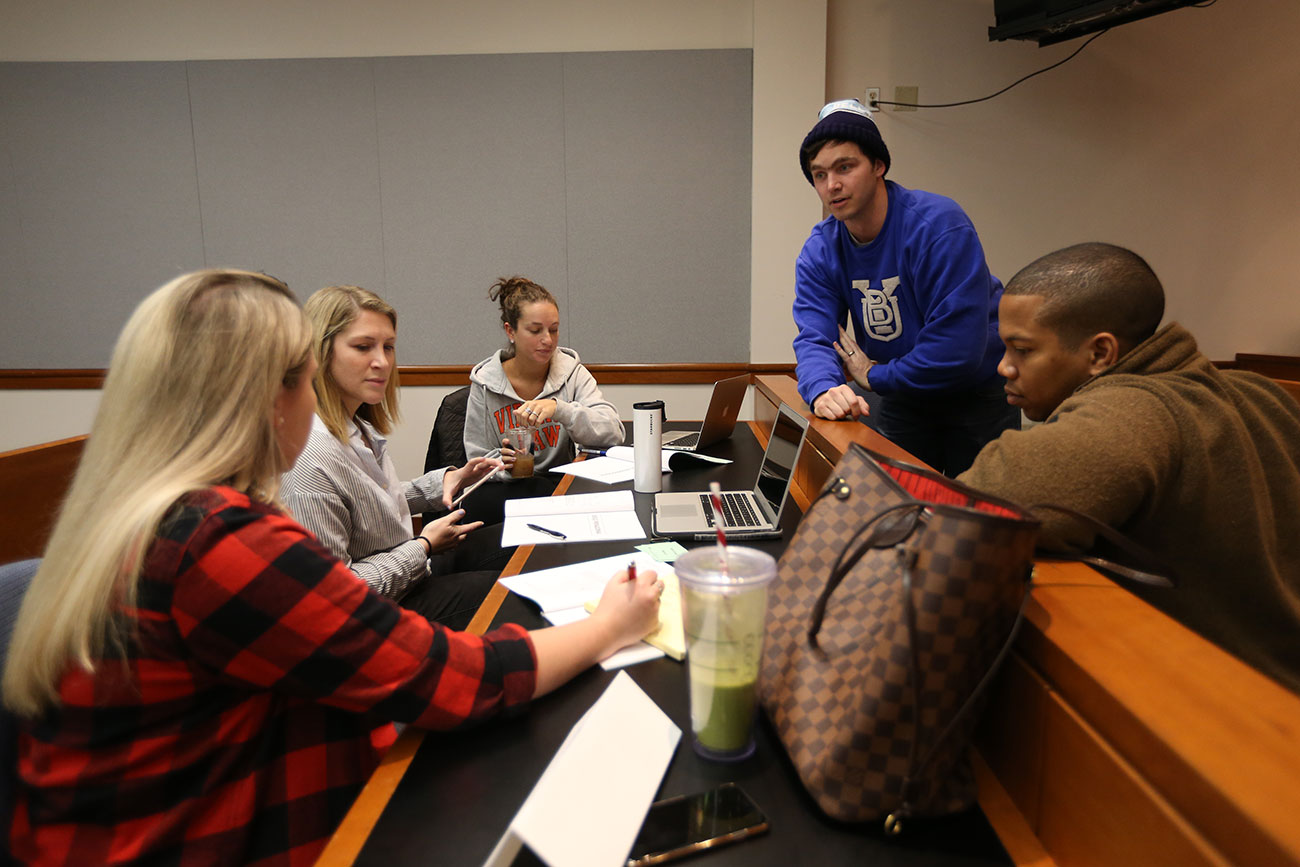At the University of Virginia School of Law, the delicate art of compromise has found a home in the curriculum.
“Negotiations,” a new course this year, is designed to teach students the persuasive skills needed across a wide variety of situations a lawyer might encounter. Along with law professor Molly Bishop Shadel, a 2009 Law School alumnus Ben Sachs, is teaching the course. Sachs, an adjunct professor, is president of The Landing Group, a strategic communication consulting service.
“Lawyers negotiate all the time, no matter what kind of law they practice,” Shadel said. “For example, courtroom lawyers find that their cases settle, so they must negotiate the best settlement they can for a client; defense attorneys might find themselves negotiating on behalf of their clients to get the best plea deal possible.
“If you’re a transactional lawyer, you might find yourself negotiating the terms and conditions of a merger. And you certainly should be able to negotiate on behalf of yourself about the terms of your own employment,” she said.

Adjunct professor Ben Sachs said, “The key to negotiation is getting in their head and convincing them, through their own interests, that it actually makes sense for them to do this deal.” (Photo by Andrew Shurtleff)
“Negotiation is, in part, about emotional intelligence, about understanding what’s going on in somebody else’s head,” Shadel said. “This theme runs through all of our public speaking classes: people are people. People are not robots. Abstract theory alone is not persuasive. Human beings like logic, but human beings also have emotions; they care about other people. To be persuasive, you have to pay attention to emotions.”
Because of this, an important aspect of the “Negotiations” class involves taking some of the mystique out of the anxiety-inducing notion of “the art of the deal.”
“Many people think that there are tricks,” Shadel said. “People worry that they’re going to go in and be negotiating with Donald Trump, and he knows all the tricks. That makes people afraid. For some, that might cause you to avoid negotiating altogether – people will pay money to not negotiate over the price of a car, for example. Others go to the other extreme – they are fearful, so they approach a negotiation as aggressively as possible.
“Our thesis is that either extreme can be a mistake, and that if you’re approaching a negotiation with fear and thinking only about getting out of there as quickly as you can, or negotiating with the thought that I can only win if you lose, you’re not going to be as effective as you could be if you took a step back and said, ‘OK, what are both parties trying to do?’”
A recent class exercise involving oil prices revealed the need for empathy. Over the course of a 90-minute exercise, students were assigned the roles of two small, oil-rich countries, and were charged with setting the price of oil they produced to sell to a larger country. The students’ best possible outcomes were often foiled by hardball tactics and gamesmanship that perhaps could have been avoided with a more holistic negotiating approach. (It was, it should be noted, only the second week of the course.)
In most negotiations, Sachs said, “You’re trying to convince someone that the deal you’re offering is good for them. If you can convince them the deal is good for them – without bullying them into it – then they’re walking away happier, and you get the best of both worlds. The key to negotiation is getting in their head and convincing them, through their own interests, that it actually makes sense for them to do this deal.”
If both parties are convinced that they’ve been treated fairly, the deal is more likely to be a lasting one.
“One of my definitions of a good deal is one that it is not fragile,” Shadel said. If a business deal is struck, but one party doesn’t feel good about it – either because of the outcome or the tactics used – you’re likely to try to get out of the contract at your first opportunity. “You want a deal that isn’t just going to be the headline and then falls apart the very next day.”
Third-year law student Lauren Dugas agrees. “I’ve loved that professors Shadel and Sachs are focusing on collaborative negotiations,” she said. “The focus isn’t on winning, it’s on finding a mutually beneficial solution where both sides feel comfortable with the outcome. This way of looking at negotiations is great in an ever-shrinking world where it’s not unrealistic to expect to encounter the same people again at different points in your career.”
During the debriefing session following the oil-pricing exercise, students discussed how the negotiations had gone, and grumbled light-heartedly about tough tactics. But it was clear that even without real money at stake, some of the negotiating partners would require some extra persuading the next time they were asked to make a deal.
Shadel and Sachs believe that dealing with the feelings generated by a tough negotiation, and learning how to use them in a positive way, is an important part of the process of becoming a skilled negotiator.
“Some of them might end up in conversations that are not pleasant, that are contentious, even,” Shadel said. “And that is very useful, because that helps students figure out how to deal with difficult personalities, learn about their own triggers, and practice how to handle it. It’s going to happen. It’s not realistic to think you’re going to go into a negotiation and never feel any emotions at all. The question is not how do I get rid of my emotions, but what do I do with them?”
Sachs agreed, using a technological metaphor.
“Humans run on software,” he said. “You have to consider the psychology of the human brain in your negotiation. If you ignore that, it’s a bit like getting frustrated with a computer because you don’t know how it works.”
Media Contact
Article Information
March 21, 2016
/content/uva-law-course-helps-students-master-art-negotiation

